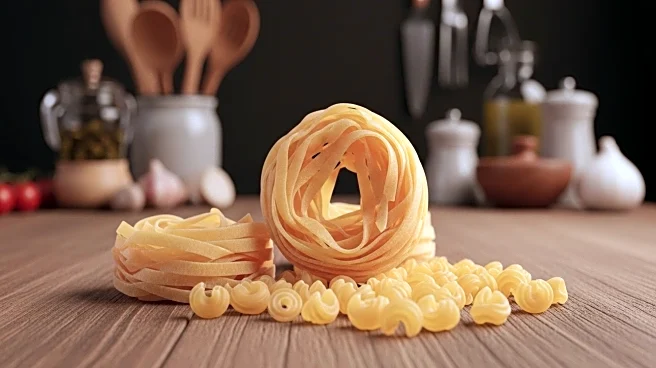What is the story about?
What's Happening?
President Trump has announced plans to impose a 92% tariff on Italian pasta imports, targeting major manufacturers such as La Molisana and Garofalo. This move follows an investigation by the U.S. Department of Commerce into alleged dumping practices, where foreign firms export goods at lower prices than in their domestic markets. Italian pasta producers, including family-run brands like Barilla and Pasta Rummo, are concerned about the potential impact on their U.S. sales, which have been thriving due to the growing demand for premium pasta. The tariffs are set to take effect in January, and Italian producers are preparing to take legal action against the decision.
Why It's Important?
The proposed tariffs could significantly affect the U.S. pasta market, potentially leading to higher prices for consumers and reduced availability of popular Italian brands. This situation highlights the broader implications of trade policies on international relations and consumer choice. Italian producers fear that the tariffs will force them to reconsider their business strategies, possibly leading to investments in U.S. factories. The move is seen as a hyper-protectionist measure that could disrupt the longstanding trade relationship between the U.S. and Italy, impacting the entire Italian food industry.
What's Next?
Italian producers, along with the Italian government and the European Commission, are lobbying Washington to reconsider the tariffs. Italy's agriculture minister has criticized the move as unnecessary and unjustified. If the tariffs proceed, Italian companies may need to explore alternative strategies, such as establishing production facilities in the U.S. or diversifying their export markets. The situation remains fluid, with ongoing diplomatic efforts to resolve the trade dispute.
Beyond the Headlines
The tariffs could exacerbate existing tensions over 'Italian sounding' brands in the U.S., which mimic the names of well-known Italian food products. This issue affects the global market for Italian goods, with imitation products valued at approximately €120 billion, €40 billion of which are produced in the U.S. The debate over authentic branding and consumer protection in food labeling is likely to intensify as the tariffs take effect.















